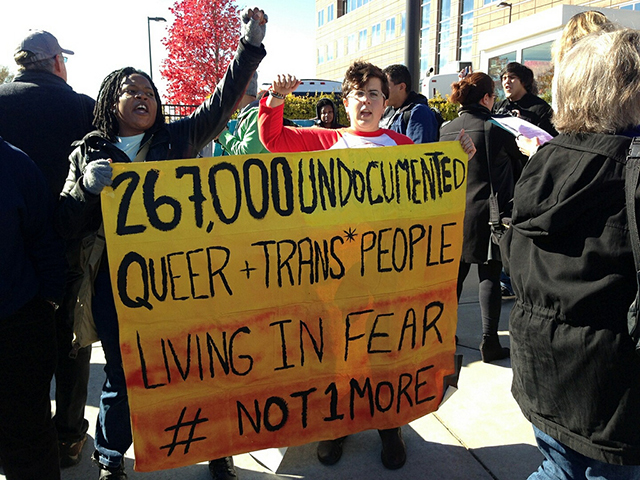
The Supreme Court’s groundbreaking decision to require all US states to license and recognize same-sex marriages is a deeply meaningful victory, especially for LGBTQ families who do not live in big cities or blue states.
This decision comes after numerous victories on the state level for gay marriage, civil unions and same-sex adoption rights, but for those of us who live in conservative or rural areas, there is a special power to federal wins: They are often the only ones that include our families.
Today’s ruling on gay rights will enable thousands to experience the culture change of the recognition of their love and families. It will also enable thousands of people and families to access basic rights such as the right to marry, to visit their partners in the hospital, and to legally form chosen families.
However, it will not solve all of the life-or-death issues facing LGBTQ people today – issues that include mass incarceration, poverty, white supremacy, gender oppression and detention conditions for trans women of color. And making rights like health care or migration rights contingent on marriage will not deliver these rights to the many LGBTQ who are not married.
We must remember that today’s victory was made possible not by years of single-issue advocacy on gay marriage but rather by the thousands of LGBTQ people who built a visible and conscious base throughout the 1960s, 1970s and 1980s.
At the origin point of our movement has been not a request for our dignity as LGBTQ people, but an insistence on it. The organizing that forced mainstream culture’s hand on our very humanity and right to survive did not start out picking issues around our quality of life, or try to make us more palatable or respectable to a mainstream.
Our struggle began as one centered on life-and-death LGBTQ issues: the right to live out loud as we are, the right to gather together in any way we please without being raped or killed for it, and the public and private space to tell the truth about ourselves to ourselves, and to others.
June is Pride season in many parts of the US. It has been more than four decades since the riots at Stonewall that kicked up and kicked off what is seen as the modern-day history of the LGBTQ movement. Today, the need remains great for the kind of organizing that birthed this movement.
The question before us today is: What does the LGBTQ movement do with all we have built? It is time to look inside, and remember where and whom we come from, and it is time to focus a great deal more of our substantial resources on the life-and-death issues our communities face. In doing so, we have the opportunity to celebrate this victory in a way worthy of our communities, and push forward for a future worthy of us as well.
Join us in defending the truth before it’s too late
The future of independent journalism is uncertain, and the consequences of losing it are too grave to ignore. To ensure Truthout remains safe, strong, and free, we need to raise $22,000 by the end of today. Every dollar raised goes directly toward the costs of producing news you can trust.
Please give what you can — because by supporting us with a tax-deductible donation, you’re not just preserving a source of news, you’re helping to safeguard what’s left of our democracy.